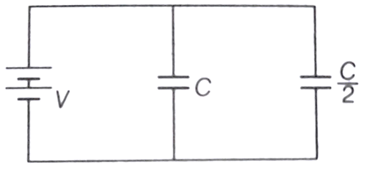 Multiple Choice Questions
Multiple Choice QuestionsTwo identical conducting balls A and B have positive charges q1 and q2 respectively. But q1 ≠ q2. The balls are brought together so that they touch each other and then kept in their original positions. The force between them is
less than that before the balls touched
greater than that before the balls touched
same as that before the balls touched
zero
A positively charged ball hangs from a silk thread. we put a positive test charge qo at a point and measure F/qo, then it can be predicted that the electric field strength E
>F/qo
=F/q
<F/qo
Cannot be estimated
A.
>F/qo
Due to the presence of test charge qo in front of the positively charged ball, there would be a redistribution of charge on the ball. In the redistribution of charge, there will be less charge on the front half surface and more charge on the back half surface. As a result, the net force F between ball and charge will decrease, i.e., the electric field is decreased. Thus, the actual electric field will be greater than F/qo
Capacitor C1 of capacitance 1μF and capacitor C2 of capacitance 2 μF are separately charged fully by a common battery. The two capacitors are then separately allowed to discharged through equal resistors at time t =0
the current in each of the two discharging circuits is zero at t = 0
the currents in the two discharging circuits at t= 0 are equal but non-zero
the currents in the two discharging circuits at t=0
Capacitor C1 loses 40% of its initial charge sooner than C2 loses 40% of the initial charge.
Two condensers, one of capacity C and the other of capacity C/2, are connected to a V- volt battery, as shown.

The work done in charging fully both the condensers is
CV2
A capacitor of capacitance 5μF is connected as shown in the figure. The internal resistance of the hell is 0.5 Ω. The amount of charge on the capacitor plates is

80μC
40 μC
20 μC
10μC
Two metal plates having a potential difference of 800 V and 2 cm apart. It is found that a particle of mass 1.96 x 10-15 kg remaining suspended in the region between the plates. The charge on the particle must be (e = elementry charge)
8e
6e
3e
2e
The working of dynamic is based on the principle of
Electromagnetic induction
chemical effect of current
magnetic effect of current
heating effect of current
The capacity of a parallel plate capacitor with no dielectric substance but with a separation of 0.4 cm is 2µF. The separation is reduced to half and it is filled with a dielectric substance of value of 2.8. The final capacity of capacitor is
15.6μF
11.2μF
19μF
22.4μF
The plates of a parallel plate capacitor of capacity of 50 µF are charged by a battery to a potential of 100 volt. The battery remains connected the plates are separated from each other so that the distance between them is doubled. Then, the energy spent by battery in doing so, will be
42.5×10-2J
25×10-2J
Two small magnets each of magnetic moment 10 Am2 are placed in end on position 0.1 m apart from their centres. The force acting between them is
0.6N
0.06N
0.06×107N
0.6×107N
